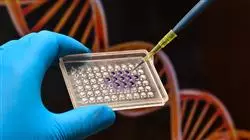University certificate
The world's largest faculty of medicine”
Introduction to the Program
New scenarios in Clinical Nutrition push to develop new specialization programs in medicine that fit professionals' real needs so that they can incorporate advances in dietary management and improve patient prognosis"

The Specialization in Clinical Nutrition is an essential response from professionals to the healthcare and preventive needs of the population in terms of nutrition and health. An example of this is the growing implementation of Nutrition and Dietetics Units or Services led by physicians.
The Professional master’s degree offers the student the possibility of deepening and updating knowledge, using the latest educational technology. It provides a global vision of Clinical Nutrition while focusing on the most important and innovative aspects of adult nutrition, with an update on the nutritional therapy of the most prevalent pathologies; as well as pediatric nutrition including from the intrauterine phase to adolescence and the diseases in which nutrition plays a highly relevant role.
This program provides specialization in the field of Clinical Nutrition in areas of particular interest such as:
- Nutrigenetics and Nutrigenomics
- Nutrition and obesity
- Sports nutrition
- Nutrition in chronic diseases
- Hospital dietetics
- Food allergies
This program is methodologically designed for distance learning in order to guarantee optimal supervision.
With this specialization, you will have the opportunity to undertake a program that brings together the most advanced and in-depth knowledge in the field, where a group of highly regarded professors with extensive international experience provides you with the most complete and up-to-date information on the latest advances and techniques in Clinical Nutrition.
Update your knowledge with the Professional master’s degree in Clinical Nutrition"
This Professional master’s degree in Clinical Nutrition contains the most complete and updated scientific program on the market. The most important features of the program include:
- More than 100 clinical cases presented by experts in nutrition
- The graphic, schematic and practical contents of the course are designed to provide all the essential information required for professional practice
- It contains exercises where the self-assessment process can be carried out to improve learning
- Algorithm-based interactive learning system for decision-making for patients with feeding problems
- Clinical practice guidelines on the different pathologies related to nutrition
- All of this will be complemented by theoretical lessons, questions to the expert, debate forums on controversial topics, and individual reflection assignments
- Content that is accessible from any fixed or portable device with an Internet connection
This Professional master’s degree is the best investment you can make in the selection of a refresher program for two reasons: in addition to updating your knowledge in Clinical Nutrition, you will obtain a qualification from TECH Global University"
Its teaching staff includes renowned specialists in nutrition based on clinical practice, who bring the experience of their work to this training.
The multimedia content developed with the latest educational technology will provide the physician with situated and contextual learning, i.e., a simulated environment that will provide immersive training programmed to train in real situations.
This program is designed around Problem-Based Learning, whereby the physician must try to solve the different professional practice situations that arise during the course. For this purpose, the phys ician will be assisted by an innovative interactive video system created by renowned and experienced experts in the field of nutrition
with extensive teaching experience.
Incorporate the latest developments in clinical nutrition into your daily practice and improve your patient care"

You will be able to complete the Professional master’s degree 100% online, adapting it to your needs and making it easier for you to take it while you carry out your full-time healthcare activity"
Why study at TECH?
TECH is the world’s largest online university. With an impressive catalog of more than 14,000 university programs available in 11 languages, it is positioned as a leader in employability, with a 99% job placement rate. In addition, it relies on an enormous faculty of more than 6,000 professors of the highest international renown.

Study at the world's largest online university and guarantee your professional success. The future starts at TECH”
The world’s best online university according to FORBES
The prestigious Forbes magazine, specialized in business and finance, has highlighted TECH as “the world's best online university” This is what they have recently stated in an article in their digital edition in which they echo the success story of this institution, “thanks to the academic offer it provides, the selection of its teaching staff, and an innovative learning method aimed at educating the professionals of the future”
A revolutionary study method, a cutting-edge faculty and a practical focus: the key to TECH's success.
The most complete study plans on the university scene
TECH offers the most complete study plans on the university scene, with syllabuses that cover fundamental concepts and, at the same time, the main scientific advances in their specific scientific areas. In addition, these programs are continuously being updated to guarantee students the academic vanguard and the most in-demand professional skills. In this way, the university's qualifications provide its graduates with a significant advantage to propel their careers to success.
TECH offers the most comprehensive and intensive study plans on the current university scene.
A world-class teaching staff
TECH's teaching staff is made up of more than 6,000 professors with the highest international recognition. Professors, researchers and top executives of multinational companies, including Isaiah Covington, performance coach of the Boston Celtics; Magda Romanska, principal investigator at Harvard MetaLAB; Ignacio Wistumba, chairman of the department of translational molecular pathology at MD Anderson Cancer Center; and D.W. Pine, creative director of TIME magazine, among others.
Internationally renowned experts, specialized in different branches of Health, Technology, Communication and Business, form part of the TECH faculty.
A unique learning method
TECH is the first university to use Relearning in all its programs. It is the best online learning methodology, accredited with international teaching quality certifications, provided by prestigious educational agencies. In addition, this disruptive educational model is complemented with the “Case Method”, thereby setting up a unique online teaching strategy. Innovative teaching resources are also implemented, including detailed videos, infographics and interactive summaries.
TECH combines Relearning and the Case Method in all its university programs to guarantee excellent theoretical and practical learning, studying whenever and wherever you want.
The world's largest online university
TECH is the world’s largest online university. We are the largest educational institution, with the best and widest online educational catalog, one hundred percent online and covering the vast majority of areas of knowledge. We offer a large selection of our own degrees and accredited online undergraduate and postgraduate degrees. In total, more than 14,000 university degrees, in eleven different languages, make us the largest educational largest in the world.
TECH has the world's most extensive catalog of academic and official programs, available in more than 11 languages.
Google Premier Partner
The American technology giant has awarded TECH the Google Google Premier Partner badge. This award, which is only available to 3% of the world's companies, highlights the efficient, flexible and tailored experience that this university provides to students. The recognition as a Google Premier Partner not only accredits the maximum rigor, performance and investment in TECH's digital infrastructures, but also places this university as one of the world's leading technology companies.
Google has positioned TECH in the top 3% of the world's most important technology companies by awarding it its Google Premier Partner badge.
The official online university of the NBA
TECH is the official online university of the NBA. Thanks to our agreement with the biggest league in basketball, we offer our students exclusive university programs, as well as a wide variety of educational resources focused on the business of the league and other areas of the sports industry. Each program is made up of a uniquely designed syllabus and features exceptional guest hosts: professionals with a distinguished sports background who will offer their expertise on the most relevant topics.
TECH has been selected by the NBA, the world's top basketball league, as its official online university.
The top-rated university by its students
Students have positioned TECH as the world's top-rated university on the main review websites, with a highest rating of 4.9 out of 5, obtained from more than 1,000 reviews. These results consolidate TECH as the benchmark university institution at an international level, reflecting the excellence and positive impact of its educational model.” reflecting the excellence and positive impact of its educational model.”
TECH is the world’s top-rated university by its students.
Leaders in employability
TECH has managed to become the leading university in employability. 99% of its students obtain jobs in the academic field they have studied, within one year of completing any of the university's programs. A similar number achieve immediate career enhancement. All this thanks to a study methodology that bases its effectiveness on the acquisition of practical skills, which are absolutely necessary for professional development.
99% of TECH graduates find a job within a year of completing their studies.
Professional Master's Degree in Clinical Nutrition
Due to the growing interest that exists around the development and evolution of its dietary formulation practices and the constant research carried out in the area, clinical nutrition stands out as one of the medical specialties of greater progress and modernization in recent years. This situation has generated a growing interest, on the part of expert professionals in the field, for the approach of academic programs that allow an adequate approach and update in front of the new possibilities of intervention in the sector. Understanding this fact and responding to this need, in TECH Global University we have developed our Professional Master's Degree in Clinical Nutrition focused on the qualification of the professional. In this postgraduate program, special emphasis will be placed on the knowledge of the new modalities of dietary counseling applied to the nutrition of patients with biliary pathologies. In addition, the following topics will be updated: the identification of the multiple aspects to be considered in the dietary formulation adapted to patients with irritable bowel disease; and the different alternatives of nutritional counseling in the management of patients with hemochromatosis.
Study a Professional Master's Degree in Clinical Nutrition completely online
The diverse scenarios and medical contexts in which clinical nutrition counseling practices are developed highlight this sector as one of the most demanding specialties with respect to the ability of its professionals to adapt and resolve. In our Professional Master's Degree you will address the identification of the great challenges and vicissitudes that accompany the continuous development of the area of clinical nutrition, contemplating, in turn, the modernization of the following aspects: knowledge of the different alternatives of nutritional approach in patients with metabolic stress; and the identification of the various dietary approaches applied in nutritional counseling to individuals with chronic renal failure.







